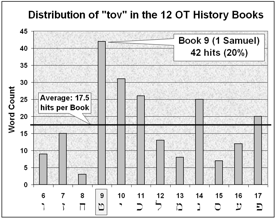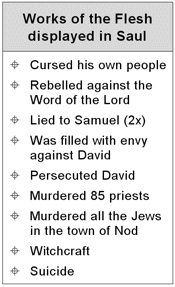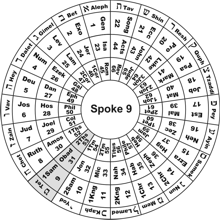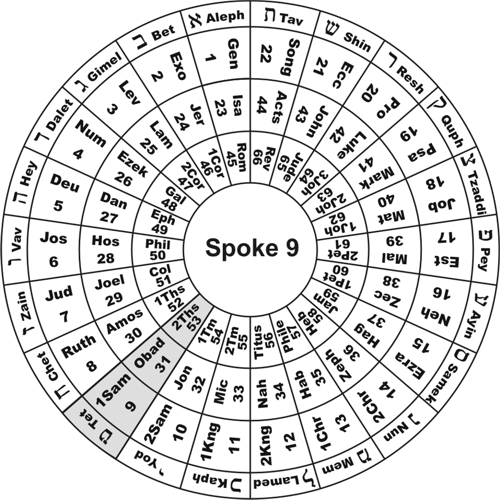1 Samuel: Rise and Fall of Goodly King Saul
Now there was a man of Benjamin, whose name was Kish, the son of Abiel, the son of Zeror,
the son of Bechorath, the son of Aphiah, a Benjamite, a mighty man of power. And he had a son,
whose name was Saul, a choice young man, and a goodly (tov): and there was not among the
children of Israel a goodlier (tov) person than he: from his shoulders and upward he was higher
than any of the people.
1 Samuel 9:1ff (Spoke 9, Cycle 1)
 The Bible
Wheel is a never-ending source
of amazement that grows ever deeper the more it is studied. When I began researching the Ninth Spoke, I did not
know what I would find, but I did know what to expect given God's revelation of tov in the Alphabetic Verses.
This is what causes such a profound sense of wonderment. I knew what to expect, and behold, there it is!
This Map of Heaven has
proven itself yet again. The graph shows the distribution of the KeyWord tov in the
twelve Old Testament History Books.
It appears there 211 times, with the peak of 42 hits in the Ninth Book, corresponding to Tet. This accounts for
about 20% of all occurrences in this canonical division, which is 2.4 times higher than the average
of 17.5 hits per Book. Once again, as on every other Spoke of the Wheel, we have a direct and obvious integration of
the content of this Book with the symbolic meaning of its corresponding Hebrew Letter. The Bible
Wheel is a never-ending source
of amazement that grows ever deeper the more it is studied. When I began researching the Ninth Spoke, I did not
know what I would find, but I did know what to expect given God's revelation of tov in the Alphabetic Verses.
This is what causes such a profound sense of wonderment. I knew what to expect, and behold, there it is!
This Map of Heaven has
proven itself yet again. The graph shows the distribution of the KeyWord tov in the
twelve Old Testament History Books.
It appears there 211 times, with the peak of 42 hits in the Ninth Book, corresponding to Tet. This accounts for
about 20% of all occurrences in this canonical division, which is 2.4 times higher than the average
of 17.5 hits per Book. Once again, as on every other Spoke of the Wheel, we have a direct and obvious integration of
the content of this Book with the symbolic meaning of its corresponding Hebrew Letter.
The graph, while quite enlightening, shows only the numbers. The real meat is found in the intricate
interweaving of tov throughout the fabric of 1 Samuel. God placed it at primary articulation points in the story
of the rise and fall of King Saul and the transfer of the kingdom to David, which is, of course, the
most prominent theme of the Ninth Book. God used it twice when He introduced Saul in chapter 9 (quoted above).
The reason for the institution of the kingdom is explained in the previous chapter when the people saw that Samuel was
old and that his sons "walked not in his ways, but turned aside after lucre, and took bribes, and perverted judgment" (1 Sam 8:3).
They used this as an occasion to request a king to rule over them. The Lord answered, saying:
Hearken unto the voice of the people in all that they say unto thee: for they have not rejected thee,
but they have rejected me, that I should not reign over them. ... Now therefore hearken unto their voice: howbeit yet
protest solemnly unto them, and shew them the manner of the king that shall reign over them.
1 Samuel 8:7ff (Spoke 9, Cycle 1)
It is here in Samuel's solemn warning that we find another double occurrence of tov:
And he said, This will be the manner of the king that shall reign over you: He will take your sons,
and appoint them for himself, for his chariots, and to be his horsemen; and some shall run before his chariots. ...
And he will take your fields, and your vineyards, and your olive-yards, even the best (tov) of them,
and give them to his servants. ... And he will take your menservants, and your maidservants, and your goodliest (tov)
young men, and your asses, and put them to his work.
1 Samuel 8:11ff (Spoke 9, Cycle 1)
Despite this warning, the people maintained their demand for a mortal king. In answer to this, Samuel made
a promise drawn directly from the Tet Alphabetic Verses,
as discussed in the article called Teaching the Good and the Upright Way.
Saul Rejected as King
Samuel also said unto Saul, The LORD sent me to anoint thee to be king over his people,
over Israel: now therefore hearken thou unto the voice of the words of the LORD. Thus saith the LORD of hosts,
I remember that which Amalek did to Israel, how he laid wait for him in the way, when he came up from Egypt.
Now go and smite Amalek, and utterly destroy all that they have, and spare them not; but slay both man and woman,
infant and suckling, ox and sheep, camel and ass. ... But Saul and the people spared Agag, and the best (tov)
of the sheep, and of the oxen, and of the fatlings, and the lambs, and all that was good (kol hatov), and would not
utterly destroy them: but every thing that was vile and refuse, that they destroyed utterly.
1 Samuel 15:1ff (Spoke 9, Cycle 1)
The fall of Saul came as a result of his willful disobedience to the command given by the Lord Himself
to destroy everything belonging to Amalek, grandson of Esau the brother of Jacob. This is another major articulation point
in the flow of the story, and again it is twice marked with the Tet KeyWord tov which is,
in fact, the key to the sin that led to his fall. The second instance is in the phrase
kol hatov which literally means all the good ("ha" is the definite article, BW book pg 183).
After his sin, Saul deliberately violated the Ninth Commandment,
twice lying to the Prophet Samuel that he had indeed fulfilled the Word of the Lord:
And Samuel came to Saul: and Saul said unto him, Blessed be thou of the LORD: I have performed the commandment
of the LORD. And Samuel said, What meaneth then this bleating of the sheep in mine ears, and the lowing of the oxen
which I hear? And Saul said, They have brought them from the Amalekites: for the people spared the best (tov) of
the sheep and of the oxen, to sacrifice unto the LORD thy God; and the rest we have utterly destroyed. ... And Samuel said,
When thou wast little in thine own sight, wast thou not made the head of the tribes of Israel, and the LORD
anointed thee king over Israel? And the LORD sent thee on a journey, and said, Go and utterly destroy the sinners the Amalekites,
and fight against them until they be consumed. Wherefore then didst thou not obey the voice of the LORD,
but didst fly upon (eet) the spoil, and didst evil in the sight of the LORD? And Saul said unto
Samuel, Yea, I have obeyed the voice of the LORD, and have gone the way which the LORD sent me, and have brought Agag
the king of Amalek, and have utterly destroyed the Amalekites.
1 Samuel 15:13ff (Spoke 9. Cycle 1)
Samuel characterized Saul's sin with the word  (eet, fly upon), which was used
earlier to describe the
ravenous sin that resulted from his wicked curse upon his people. It reveals his powerful lust which is an essential aspect
of Saul's scriptural role as a Type of the Flesh. Samuel's response is probably the
best known passage of this Book: (eet, fly upon), which was used
earlier to describe the
ravenous sin that resulted from his wicked curse upon his people. It reveals his powerful lust which is an essential aspect
of Saul's scriptural role as a Type of the Flesh. Samuel's response is probably the
best known passage of this Book:
And Samuel said, Hath the LORD as great delight in burnt offerings and sacrifices, as in obeying the
voice of the LORD? Behold, to obey is better (tov) than sacrifice, and to hearken than the fat of rams.
For rebellion is as the sin of witchcraft, and stubbornness is as iniquity and idolatry. Because thou hast rejected
the word of the LORD, he hath also rejected thee from being king. ... And as Samuel turned about to go away,
he laid hold upon the skirt of his mantle, and it rent. And Samuel said unto him, The LORD hath rent the kingdom
of Israel from thee this day, and hath given it to a neighbour of thine, that is better (tov) than thou.
1 Samuel 14:22ff (Spoke 9, Cycle 1)
Good versus Evil, Spirit versus Flesh: Saul's Persecution of David
And he sent, and brought him in. Now he was ruddy, and withal of a beautiful countenance,
and goodly (tov) to look to. And the LORD said, Arise, anoint him: for this is he.
Then Samuel took the horn of oil, and anointed him in the midst of his brethren: and the Spirit of the LORD came
upon David from that day forward. But the Spirit of the LORD departed from Saul, and an evil (ra) spirit
from the LORD troubled him. ........1 Samuel 16:12ff (Spoke 9, Cycle 1)
 Just as God
marked His choice of Saul with the KeyWord tov, so also did He mark His
choice of David. But David was different than Saul. He was a man after God's own heart (1 Sam 13:14), a type of all who
have the Spirit of God. Achish said he was good (tov) "as an angel of God," and that he had
"not found evil (ra) in him since the day they met (1 Sam 29:6ff). The mere fact of David's existence enraged
Saul, a type of the flesh. The titanic struggle between these
two typological figures is marked throughout with the KeyWords tov and ra. Indeed,
David used it as a test to expose the evil intent of Saul's heart: Just as God
marked His choice of Saul with the KeyWord tov, so also did He mark His
choice of David. But David was different than Saul. He was a man after God's own heart (1 Sam 13:14), a type of all who
have the Spirit of God. Achish said he was good (tov) "as an angel of God," and that he had
"not found evil (ra) in him since the day they met (1 Sam 29:6ff). The mere fact of David's existence enraged
Saul, a type of the flesh. The titanic struggle between these
two typological figures is marked throughout with the KeyWords tov and ra. Indeed,
David used it as a test to expose the evil intent of Saul's heart:
If he say thus, It is well (tov); thy servant [David] shall have peace: but if he
be very wroth, then be sure that evil (ra) is determined by him.
1 Samuel 20:7 (Spoke 9, Cycle 1)
This test was effective – Saul went into a murderous rage and threw a javelin to kill his own
son Jonathan! Thus began Saul's persecution of David which fills the last ten chapters of 1 Samuel. He chased him throughout
the countryside but could never get close to him. David, on the other hand, was able to approach Saul as he
slept and cut a piece from his cloak. When Saul awoke and realized what had happened, he confirmed with his
own mouth Samuel's assertion that David was better (tov) than he:
And Saul lifted up his voice, and wept. And he said to David, Thou art more righteous than I:
for thou hast rewarded me good (tov), whereas I have rewarded thee evil (ra). And thou hast
shewed this day how that thou hast dealt well (tov) with me: forasmuch as when the LORD had delivered
me into thine hand, thou killedst me not. For if a man find his enemy, will he let him go well away (b'derek tovah)?
Wherefore the LOD reward thee good (tov) for that thou hast done unto me this day.
1 Samuel 24:19 (Spoke 9, Cycle 1)
The phrase b'derek tovah literally means "in the good way." This same phrase appears in the KeyLink
based on 1 Samuel 12:23 (BW book pg 222). Note the interplay the of the
diametrically opposted KeyWords tov and ra as discussed here.
|



